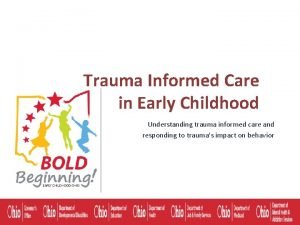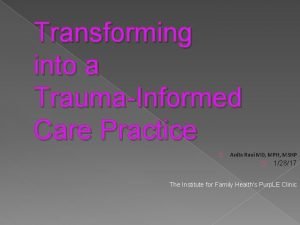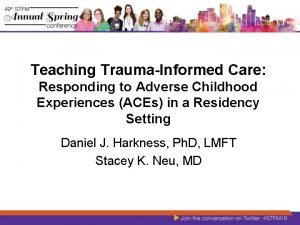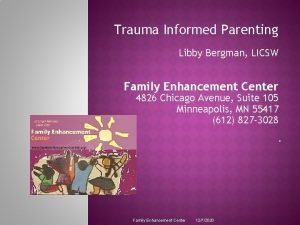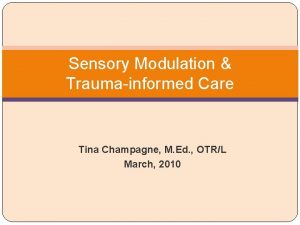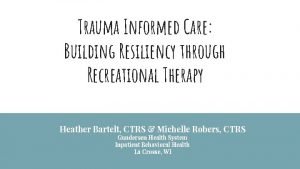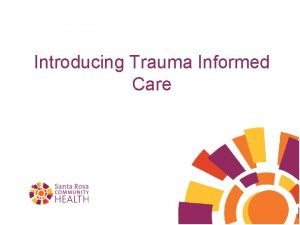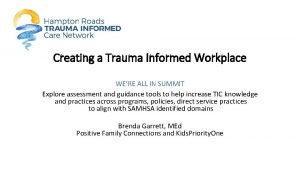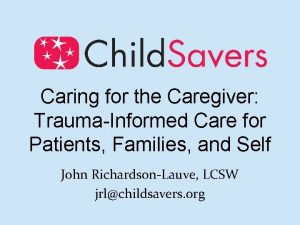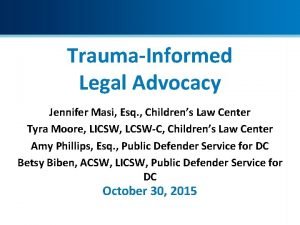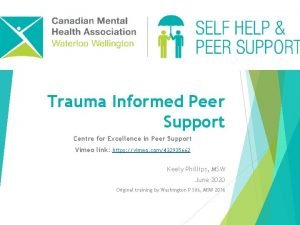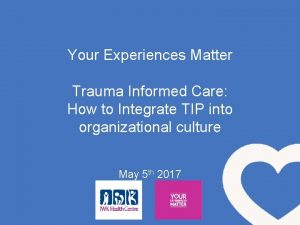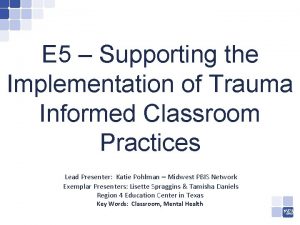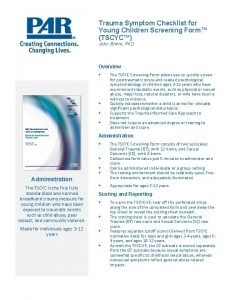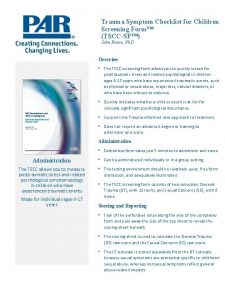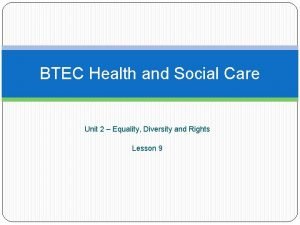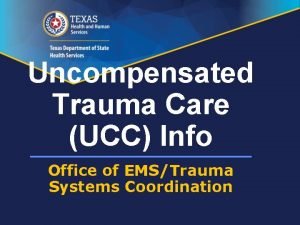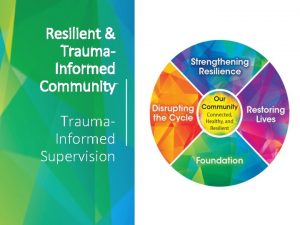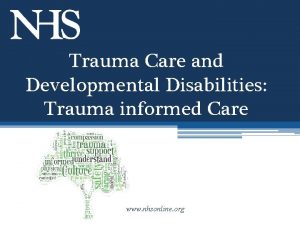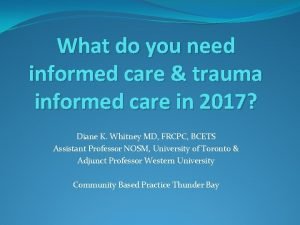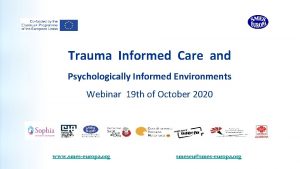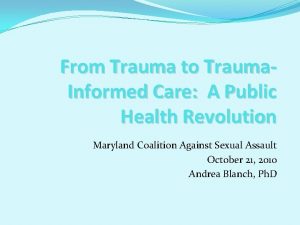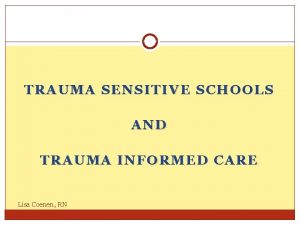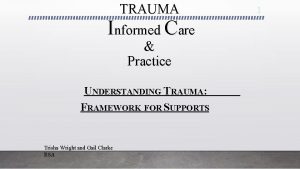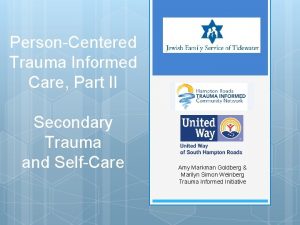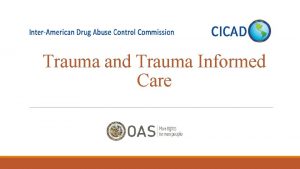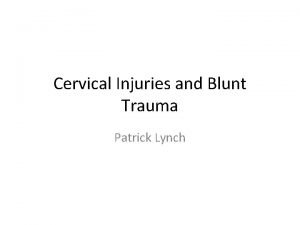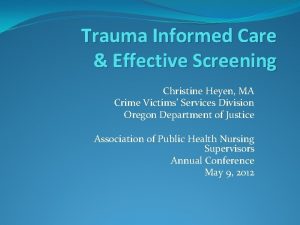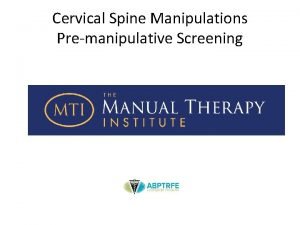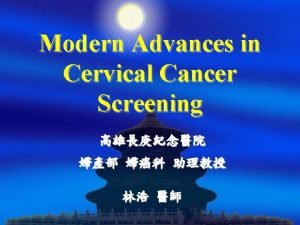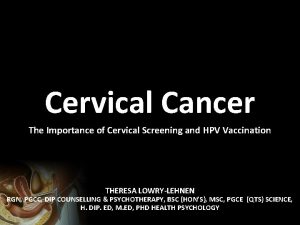Trauma informed approaches in Health Care Cervical Screening
























- Slides: 24

Trauma informed approaches in Health Care: Cervical Screening Dr Hame Lata, Consultant Reproductive and Sexual Health, Highland Sexual Health Jane Chandler, Health Improvement Specialist, NHS Highland

Overview • Summary of cervical screening • Introduction to sexual violence • Trauma informed Care

Summary of Cervical Screening • All women aged 25 to 64 in Scotland are routinely invited for cervical screening. – Women aged 25 to 49 are invited every three years – Women aged 50 to 64 are invited every five years – Transgender men in this age range may be eligible • The test can pick up changes to the cells in the cervix which if left untreated could develop into cervical cancer.

What Cervical Screening involves • Intimate genital examination which involves the insertion of a speculum into the vagina to view the cervix. • Cells, gently brushed from the cervix, are then sent to the lab for testing

Uptake In Highland Uptake for Cervical Screening for NHS Highland age group – 1 st April 2017 to 31 st March 2018 2529 3034 3539 4044 4549 5054 5559 6064 2549 5064 SIMD 1 Most deprived 66% 71% 75% 76% 79% 77% 72% 75% 73% 77% 66% ISD: 2018

Barriers to Screening

Defaulters • Somebody who does not attend for cervical screening after an invitation and subsequent reminders

Sexual violence • Evidence suggests acceptance of cervical screening is significantly lower in women who have been sexually abused. – Fear that the experience will trigger flashbacks resulting in “freezing” and “physical tension” which can lead to increased physical discomfort during the procedure. – Low self esteem – A negative body image

Introduction to Sexual Violence • Film – “Its more common than you think”


One Out of Four • One in Four women have experienced either childhood sexual abuse or some form of sexual violence as adults. • Experience of sexual violence leads to low self esteem which can lead to lack of self care and engagement with health services Eg non attendance for cervical screening

Kelly’s story • Kelly, a single 26 year old woman living with her father and younger brother, attends her local doctor’s surgery for a routine annual check for her long term condition, epilepsy. • Kelly tells us about her visit and how it makes her feel and think. She sees a general practice nurse who invites Kelly to have an opportunistic sample taken for cervical cytology screening. • This is because, according to Kelly’s records, she had not responded to letters inviting her to attend for this routine procedure.

Kelly’s Story • Film clip and activity


Activity • As a group consider the following questions – we will take feedback from each group • Q 1. Why might the NHS ask about sexual history prior to undertaking cervical screening and what is the best way to do it? • Q 2. What was there about the consultation that might have led the practitioner to consider sexual abuse in Kelly’s case? • Q 3. In your service, what indicators might lead you to think that someone might have experienced sexual violence? How might you manage this? And, what changes could you make?

Polly's Story • Polly and her husband are attending for her first antenatal appointment in their first pregnancy. • The staff caring for her initially do not know that Polly was raped by her ex-boyfriend and his friends some years ago. • She requests a planned caesarean section as she cannot see how she can go through labour due to the intimate procedures which may be involved. • Polly tells us how she feels about the care she received and the impact on her.

Polly’s Story • Film clip and activity


Activity • As a group consider the following questions – we will take feedback from each group • Q 1. What were the possible indications in Polly’s story that she had a history of sexual violence? For other women what indications might there be? • Q 2. What were the negative behaviours by health professionals in Polly’s story and what were the more positive behaviours? • Q 3. What would you do or say if a woman discloses a history of sexual violence to you?

Your role • Be aware – and approach each interaction or procedure as if the woman is a survivor of sexual violence. • Recognise the signs • Initiate discussion – sensitive curiosity • Find out what the woman needs from you • Provide care as required – explain all procedures • Stop procedure/discussion if she needs or asks you to • Assess current safety • Document findings (with awareness of issues of privacy and safety if hand-held notes)

Care for Yourself • Suspecting abuse or listening to disclosure by women can be stressful. • You/colleagues may be a survivor yourself and need support to cope with handling certain consultations. • Know who to approach for assistance in your workplace. • A number of the supports available to survivors are also there for workers supporting survivors including the Rape Crisis National Helpline – 08088 01 03 02.

Our Work In Highland • Cervical Screening Referral Pathway established between RASASH and Highland Sexual Health – supporting women and trans men who have experienced sexual violence to access cervical screening – enable survivors of sexual violence to ultimately return to main stream services.

Resources • One Out of Four (NES on line training) – www. knowledge. scot. nhs. uk/maternalhealth/lear ning/one-out-of-four. aspx • Highland Policies – http: //intranet. nhsh. scot. nhs. uk/Staff/Gender. Bas ed. Violenceresources/Pages/Default. aspx

Any Questions?
 4 r's trauma informed care
4 r's trauma informed care Lgbt trauma informed care
Lgbt trauma informed care Anita ravi md
Anita ravi md Trauma informed approach
Trauma informed approach 4 r's trauma informed care
4 r's trauma informed care Www.dfps.state.tx.us/training/trauma informed care/
Www.dfps.state.tx.us/training/trauma informed care/ Tina champagne sensory modulation and environment
Tina champagne sensory modulation and environment Trauma informed practice
Trauma informed practice Trauma-informed care activities for staff
Trauma-informed care activities for staff Trauma informed care for foster youth
Trauma informed care for foster youth Trauma informed workplace
Trauma informed workplace Trauma-informed questions for clients
Trauma-informed questions for clients Jennifer masi
Jennifer masi Kobtion
Kobtion Trauma informed advising
Trauma informed advising Trauma informed parenting discipline
Trauma informed parenting discipline Trauma informed practice
Trauma informed practice Trauma informed physical environment
Trauma informed physical environment Trauma informed practice
Trauma informed practice Tscyc screening form
Tscyc screening form Tscc scoring sheet
Tscc scoring sheet Levels of care primary secondary tertiary quaternary
Levels of care primary secondary tertiary quaternary Care provider background screening clearinghouse
Care provider background screening clearinghouse Health and social care unit 2
Health and social care unit 2 Uncompensated trauma care application texas
Uncompensated trauma care application texas
